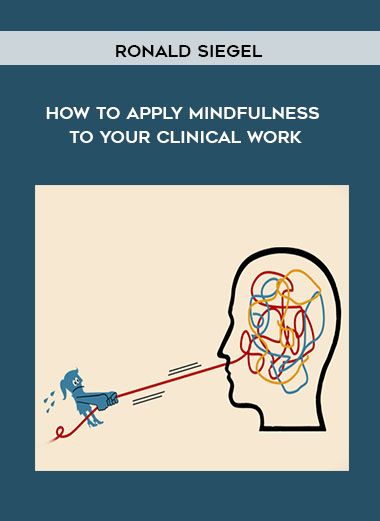NICABM – How to Apply Mindfulness to Your Clinical Work
$197.00 Original price was: $197.00.$45.00Current price is: $45.00.
Proof of item:
Expert Strategies for Working with Mindfulness
Mindfulness works.
It can help clients reduce stress, optimize learning, and improve their relationships.
Not only that, research shows that mindfulness changes the brain.
But knowing what mindfulness can do, and helping clients actually put it into practice often requires skill.
Mindfulness practice is simple but it isn’t always easy.
So we designed a program with this idea firmly in mind – and to give you expert perspectives and practical applications for working more adeptly with mindfulness . . .
. . . in nearly every clinical circumstance, no matter what objectives you’re working toward.
How to Apply Mindfulness to Your Clinical Work

How Mindfulness Can Change Both the Brain and the Body
Daniel Siegel, MD
- Mindfulness and DNA: How Mindfulness Can Raise Telomerase Levels and Change Chromosomes
- What It Means to Be Present and How It Creates Better Health and Happiness
- How to Turn a Mindful State Into a Mindful Trait
- Why What You Do With Your Mind Changes the Structure of Your Brain
- How Mindfulness Can Help Integrate the Brain

Mindfulness and the Gateways to Refuge: Finding the True Self
Tara Brach, PhD
- The One Key Thing a Practitioner Must Do to Help Clients Return to Their True Self
- How Mindfulness Can Help Us Minimize Reactivity
- Why False Refuges Look so Enticing
- Four Subtle False Refuges That Are Difficult to Recognize
- How to Find the Aliveness and Tenderness That Is in the Present Moment
- How the Sacred Art of Pausing Can Help Clients Break Unhealthy Patterns
- The Importance of Recognizing That Beliefs Are Real but Not True
- Why Mindfulness Is the Best Strategy for Coming Back to Wholeness

How to Grow Love and Compassion Out of Suffering
Jack Kornfield, PhD
- How Mindfulness Training Transforms Brokenness
- Why Over-Identifying with a Role Can Cause Tremendous Suffering
- How to Use Mindfulness and Loving Awareness to Become Free of the Past
- Thinking “Skillfully”: How to Apply Mindfulness to Solve Conflict
- Strategies for Overcoming Feelings of Unworthiness, Shame, and Guilt
- Why We Must Bring a Quality of Beginner’s Mind to Our Work

Dialectical Behavior Therapy – A New Approach to Treating Distressing Emotions
Marsha Linehan, PhD
- Mindfulness Practices to Help Your Clients Tolerate Distress and Difficult Moments
- The Three Essential Skills of Dialectical Behavior Therapy
- Why Focusing on Change Can Be Ineffective in Treating Borderline Personality Disorder
- Why Dialectical Behavior Therapy Is So Effective in Combating Thoughts of Suicide
- Dialectical Behavior Therapy and Obesity – Treating the Behavior, Not the Biology

How to Help People Connect to Loving Awareness: Expanding Our Capacity to Give and Receive Unconditional Love
Ram Dass, PhD
- Why It Is so Difficult to Give and Receive Unconditional Love
- How Mindfulness Can Allow Us to Disassociate From “Roles” and Improve Healing
- Why Health Problems Can Sharpen Attunement
- How to Love Even the People You Dislike
- How to Help Patients Overcome the Fear of Growing Old
- Why Mindful Living Prepares Us for Dying

Deconstructing Death: How Mindfulness Can Help People Manage Life’s Ultimate Transition
Joan Halifax, PhD
- GRACE – Five Steps to Cultivate Compassion When Your Attention Is Divided
- Why Practitioners Need to Regulate Their Own Response to Suffering in Order to Help Their Patients
- An Exercise in Becoming Grounded: How to Prime Attention, Equanimity, and Strength
- Healing Fictions: What They Are and How They Structure Lives and Affect Treatment
- The Art of Sitting With Not Knowing
- How to Look Past Our Biases to Serve With Openness
1 review for NICABM – How to Apply Mindfulness to Your Clinical Work
| 5 star | 100 | 100% |
| 4 star | 0% | |
| 3 star | 0% | |
| 2 star | 0% | |
| 1 star | 0% |
Sorry, no reviews match your current selections
Q & A
Related products
Personal Development
Personal Development
Jess Lively – Magic Flow School – The Ultimate Course Bundle
Personal Development
Cameron Blas – Filming And Editing Mastery With Final Cut Pro X
Personal Development
Personal Development
Personal Development
Personal Development
Personal Development














Very fast shipping. Thanks! | NICABM – How to Apply Mindfulness to Your Clinical Work